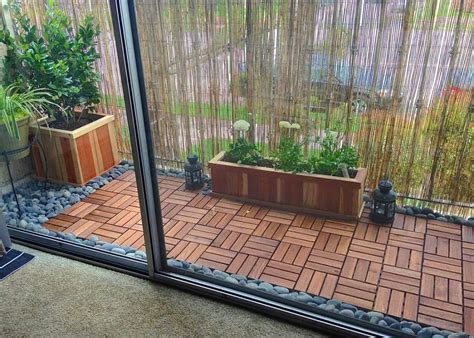Creating a Zen Balcony Garden: A Tranquil Retreat in Your Urban Space
In today’s fast-paced urban lifestyle, having a peaceful space to unwind and rejuvenate is essential. For city dwellers, finding tranquility can be a challenge, but creating a Zen balcony garden offers an oasis of calm amidst the hustle and bustle. By combining principles of Zen aesthetics with urban gardening techniques, you can transform your balcony into a soothing retreat. In this article, we will explore how to design a Zen-inspired balcony garden, the essential elements to include, and practical tips for making the most of your outdoor space.
Key Concepts of a Zen Balcony Garden
Before diving into the design process, it’s important to understand the core principles of a Zen garden and how they can be applied to a balcony setting. A Zen garden emphasizes simplicity, balance, and harmony, incorporating natural elements to evoke feelings of calm and mindfulness.
- Simplicity: Minimalism is key in a Zen garden. Fewer elements create a more peaceful environment, allowing the mind to focus on the natural beauty around it.
- Balance: In a Zen garden, elements like plants, stones, and water should be arranged thoughtfully to maintain equilibrium and visual harmony.
- Natural Elements: Zen gardens often feature rocks, sand, water, and greenery to mimic natural landscapes and create a serene atmosphere.
- Mindfulness: The design should encourage mindfulness and relaxation, promoting a space for meditation or quiet reflection.
Historical Context of Zen Gardens
Zen gardens, or karesansui, have their roots in ancient Japanese culture. Originally created by Buddhist monks, these gardens were intended to serve as spaces for meditation and spiritual reflection. Over the centuries, the concept of Zen gardens has evolved, but the core principles of simplicity, tranquility, and connection to nature have remained unchanged. In modern times, Zen gardens have been adapted for urban environments, offering an escape from the chaos of city living.
Current State Analysis: Urban Gardening and Zen Design
Urban gardening has gained significant popularity as more people seek to integrate nature into their living spaces. However, urban environments often present challenges such as limited space, pollution, and noise. Despite these obstacles, it is possible to create a Zen-inspired balcony garden that promotes relaxation and connection with nature. By incorporating container gardening techniques, using vertical space, and selecting appropriate plants, you can design a peaceful sanctuary on even the smallest of balconies.
Practical Applications for Creating a Zen Balcony Garden
To create a Zen balcony garden, follow these practical steps:
- Assess Your Space: Determine the size and shape of your balcony to decide what elements you can include. Consider the amount of sunlight, wind exposure, and available wall space for vertical gardening.
- Choose Minimalist Furniture: Opt for furniture that aligns with the principles of Zen aesthetics—simple, low-profile, and made from natural materials like bamboo or wood.
- Incorporate Natural Elements: Add potted plants, sand trays, and stones to evoke the feeling of a traditional Zen garden. Place larger stones or gravel in the corners to anchor the space.
- Select Plants with Care: Choose plants that are easy to care for and thrive in your balcony’s conditions. Bamboo, ferns, and succulents are great options for creating a sense of calm and greenery.
- Use Water Features: If space allows, include a small water fountain or a bowl of water to introduce the soothing sound of flowing water.
- Focus on Lighting: Soft lighting is essential for a peaceful atmosphere. Use lanterns, string lights, or candles to create a warm, inviting glow.
Case Studies: Successful Zen Balcony Gardens
Below are examples of successful Zen balcony garden designs:
| Garden Example | Key Features | Outcome |
|---|---|---|
| Urban Oasis in New York City | Minimalist furniture, bamboo plants, small water feature | Created a quiet retreat with natural elements despite the noise of the city. |
| Balcony Sanctuary in Tokyo | Rocks, moss, and sand trays with simple wooden seating | Achieved harmony with nature while utilizing a small space efficiently. |
| Modern Zen in San Francisco | Succulent garden, hanging plants, and raked gravel | Balanced modern design with traditional Zen principles for a contemporary retreat. |
Stakeholder Analysis: Who Benefits from a Zen Balcony Garden?
Various stakeholders benefit from incorporating Zen balcony gardens into urban spaces, including:
- Homeowners/Renters: Gain a private, tranquil space for relaxation and mindfulness.
- Urban Planners: Encouraged to promote green spaces and sustainable living solutions.
- Environmental Advocates: Support eco-friendly gardening practices in urban environments.
- Wellness Professionals: Recognize the mental and physical health benefits of outdoor, peaceful environments.
Implementation Guidelines for a Zen Balcony Garden
When implementing your Zen balcony garden, follow these guidelines for success:
- Start Small: Begin with a few key elements and build gradually. Avoid overloading the space with too many objects.
- Prioritize Functionality: Ensure that furniture and decor are both beautiful and functional. Multi-purpose items like storage benches can help maximize limited space.
- Regular Maintenance: Schedule regular care for your plants and features. Keep the area free of debris and trim plants regularly to maintain a tidy, serene look.
- Adapt to Seasonal Changes: Choose plants that will thrive year-round or rotate them seasonally. Adjust lighting and water features depending on weather conditions.
Ethical Considerations
Creating a Zen garden on a balcony raises several ethical concerns. For instance, sourcing sustainable materials and using water responsibly are crucial in an era of environmental consciousness. Homeowners should also consider the impact their garden may have on neighbors, particularly if noise from water features or scents from certain plants becomes a nuisance.
Limitations and Future Research
While Zen balcony gardens can provide a relaxing retreat, they are not without limitations. Space constraints may limit the variety of plants or features that can be included. Additionally, urban pollution and weather conditions may pose challenges in maintaining plant health. Future research could explore innovative materials for urban gardening and new techniques to mitigate these challenges, such as vertical gardening systems or air-purifying plants specifically suited for urban environments.
Expert Commentary on Zen Balcony Gardens
According to experts in the field of urban gardening, a well-designed Zen balcony garden offers more than just aesthetic appeal—it provides an essential space for mental well-being in an increasingly hectic world. Incorporating natural elements, mindfulness practices, and sustainable gardening techniques can make even the smallest balcony a sanctuary of calm and reflection. Experts also suggest that future developments in gardening technology, such as smart irrigation systems and sustainable plant care products, will make it easier for urban residents to maintain their Zen spaces with minimal effort.


